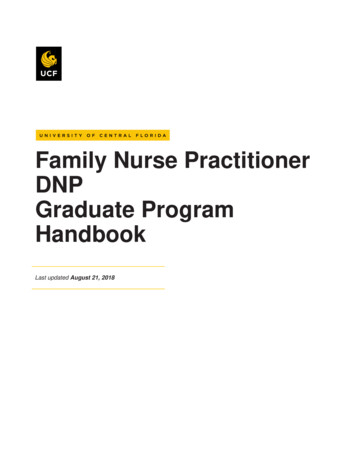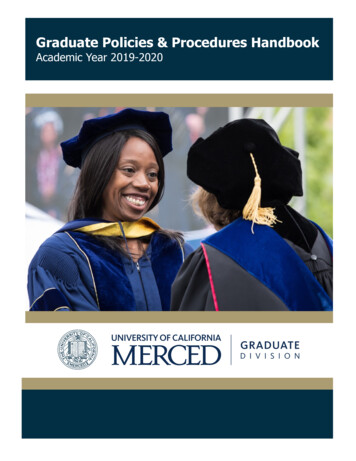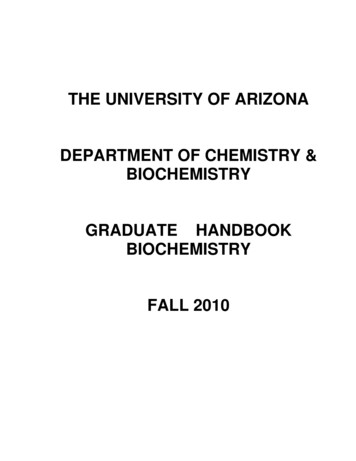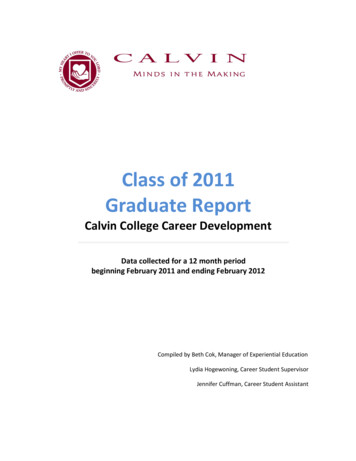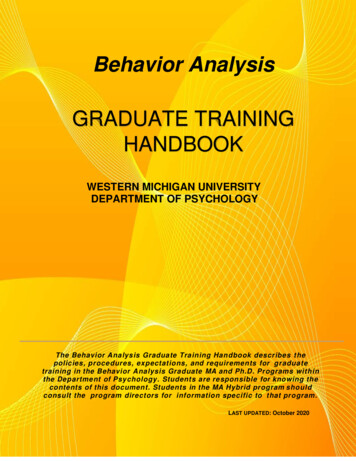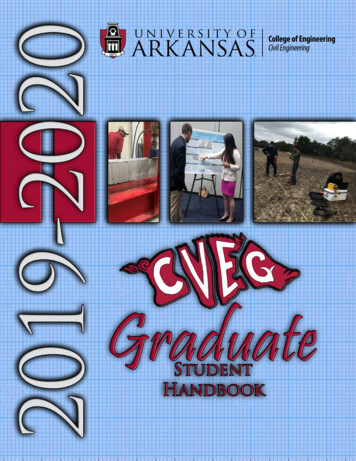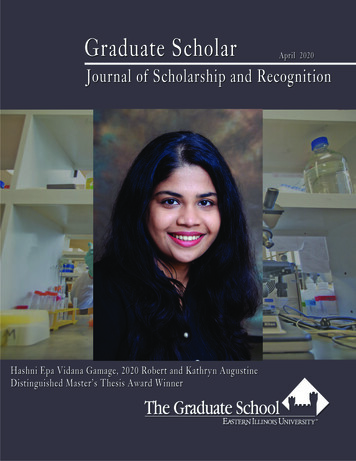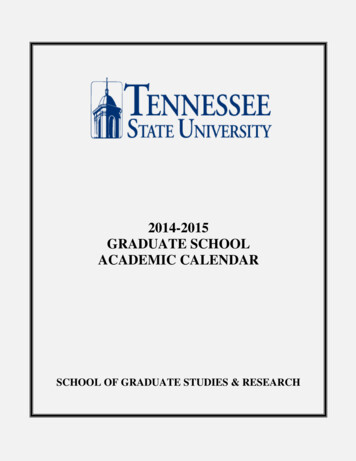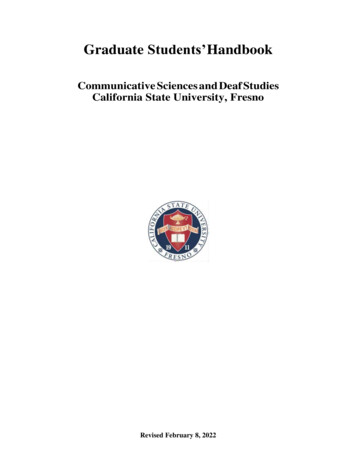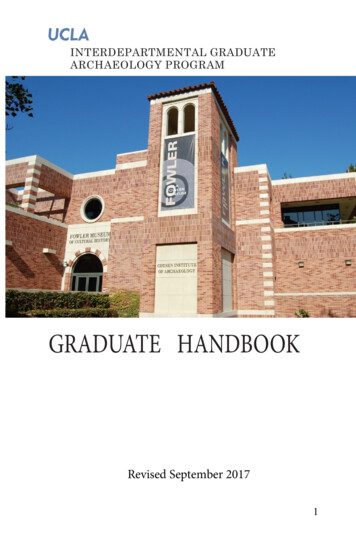
Transcription
INTERDEPARTMENTAL GRADUATEARCHAEOLOGY PROGRAMGRADUATE HANDBOOKRevised September 20171
PREFACEThis document describes the UCLA Interdepartmental Graduate Program in Archaeologyand explains policies that affect all students in the Archaeology Program. It also describesin detail the specific requirements of the graduate curriculum. If any changes in programrequirements or clarification of program policies are made during the current academicyear, they will be announced in appropriate memoranda. Graduate students and facultymembers are asked to read this document thoroughly, and to consult it when questionsarise concerning departmental regulations and policies.GUIDE TO ARCHAEOLOGY INTERDEPARTMENTALGRADUATE PROGRAMTABLE OF CONTENTSNote to Graduate Students – This guide is constantly undergoing revisions and updates tostay current with policies and procedures. For definitive answers to your questions,please see the Chair of the Archaeology IDP or Graduate Student Advisor.I. THE ARCHAEOLOGY INTERDEPARTMENTAL GRADUATEPROGRAM AT THE UNIVERSITY OF CALIFORNIA, LOS ANGELESA.B.C.INTRODUCTIONPROGRAM COMMITTEESCURRENT MEMBERS OF THE ARCHAEOLOGY PROGRAMII. ADMISSIONSIII. DEGREE REQUIREMENTSA.B.2The M.A.1.2.3.4.5.6.7.8.9.10.AdvisorM.A. CommitteeCore CoursesOther Course RequirementsCore ExaminationsFieldworkForeign Language RequirementM.A. PaperAdvancement to Candidacy and M.A. DegreeStudent Progress Review1.2.3.4.5.6.7.AdvisorPh.D. Committee – Responsibilities of CommitteeCourse RequirementsForeign Language RequirementWritten Qualifying ExaminationsOral Qualifying ExaminationCandidacy for the Ph.D. DegreeThe PH.D.
8.DissertationIV. REGISTRATION, ENROLLMENT, FEES AND FINANCIALASSISTANCEA.B.REGISTRATION AND ENROLLMENT1.In Absentia Enrollment2.Leave of AbsenceFEES AND FINANCIAL ASSISTANCE1.Fees2.Financial Assistance3
1. THE ARCHAEOLOGY INTERDEPARTMENTAL GRADUATEPROGRAM AT THE UNIVERSITY OF CALIFORNIA, LOS ANGELESA. INTRODUCTIONThe UCLA Archaeology Interdepartmental Graduate Program integrates archaeologicalfaculty throughout the University for the training of graduate students who wish to pursueinterdisciplinary research. Since the inception of the Program, over one hundred M.A.and Ph.D. degrees have been awarded in Archaeology. The mission of the ArchaeologyProgram is to train students in the best interdisciplinary practices and techniques ofarchaeological investigation. At the same time, the Archaeology Program providesstudents with a strong background in archaeological interpretation and theory that willenable them to undertake independent research, explanation, and preservation ofarchaeological heritage worldwide.The departmental and interdepartmental programs currently participating in theArchaeology Interdepartmental Graduate Program include:AnthropologyArt HistoryAsian Languages and CulturesClassicsConservation Interdepartmental ProgramGermanic Languages, Scandinavian SectionHistoryMaterials ScienceNear Eastern Languages and CulturesStudents are encouraged to take courses in any department or interdepartmental programthat offers courses suitable for their research interests in these and any other departmentsand programs in the University.The Archaeology Interdepartmental Graduate Program is closely linked with the CotsenInstitute of Archaeology at UCLA. The Cotsen Institute of Archaeology is a research unitthat coordinates scholars from throughout the University. The Cotsen Institute offerslectures, public programs, and seminars in which the Archaeology Program studentsparticipate. Students benefit from interaction with faculty, other students, and the manynational and international scholars who frequent the Cotsen Institute for talks, symposia,and as visiting scholars. The Cotsen Institute provides additional funding for studentsupport and for innovative workshops and seminars. It also publishes findings andinterpretation of archaeologists and scholars from around the world. The researchlaboratories include the Rock Art Archive and Zooarchaeology plus regional laboratoriesfrom many parts of the world with ongoing research. As a result of these many initiativesand institutional links, the Archaeology Interdepartmental Graduate Program is one of themost robust archaeological training institutions in the U.S.4
The UCLA Interdepartmental Graduate Program in Archaeology is housed in the FowlerMuseum Building and is located in Room A148. Contact information for theArchaeology Interdepartmental Graduate Program is:Telephone: 310-825-4169FAX: 310-206-4723Website: http://www.archaeology.ucla.eduFor the 2016-17 academic year, the Archaeology Program Chair is John K.Papadopoulos. The Archaeology Program Coordinator (Student Affairs Officer) isMatthew Swanson.The Archaeology Program Chair oversees all Program activities and coordinates programactivities with the Dean of Social Sciences, the Dean of Humanities and the Director ofthe Cotsen Institute.The Graduate Student’s Archaeology Association (GSAA) is composed of graduatestudents in the Archaeology Program. Current GSAA officers are Jacob Damm, AdamDiBattista, Georgi Kyorlenski, and Karime Castillo Cardenas. The GSAA organizes awide range of student activities, including the annual Graduate Student Conference, andserves to express student opinions on program matters through student participation onthe program committees described below.B.PROGRAM COMMITTEESEach academic year, the Archaeology Program Chairperson establishes a number ofcommittees that carry out various responsibilities necessary for the functioning of theProgram. Students serve on several of these committees along with faculty members. Thefaculty members are appointed by the Chairperson, while student members are elected bygraduate students in the Archaeology Program.The following is a list of the Program committees and their specific responsibilities:Committee to Administer the Archaeology Interdepartmental Graduate Program: Servesas an advisory committee to the Chair of the Archaeology IDP and includes all memberson the Core Faculty of the Archaeology IDP. A smaller Advisory Committee wasappointed in 2013-2014 by the Dean of the Social Sciences to advise the Chair on day-today business.Admissions: Committee members evaluate applications for admission to the graduateprogram; notify Program Chairperson of decisions and report evaluations to the faculty;instruct the Program Coordinator regarding information and correspondence related toadmission decisions.Fellowship/Awards: Evaluate applications and requests for fellowship, travel awards andstudent support.Curriculum: Assists the Chair in compiling the annual curriculum, reviewing any and allmatters pertaining to the curriculum.5
Committee members are rotated on an annual basis; the various committees for thecoming academic year will be announced at the beginning of the Fall Quarter of the newacademic year.C.CURRENT MEMBERS OF THE ARCHAEOLOGY PROGRAMThe Faculty of the UCLA Archaeology Interdepartmental Graduate Program consists ofall faculty on campus who are directly involved with archaeology. These are divided intotwo categories. Core Faculty are individuals who teach courses in the ArchaeologyProgram and serve as dissertation chairs. Affiliated Faculty serve on doctoral and M.A.committees and teach courses in their own departments.CORE FACULTYStephen Acabado – AnthropologyJeanne E. Arnold – AnthropologyHans Barnard – Near Eastern Languages and CulturesP. Jeffrey Brantingham – AnthropologyAaron A. Burke – Near Eastern Languages and CulturesJesse Byock – Germanic LanguagesElizabeth Carter – Near Eastern Languages and CulturesKara Cooney – Near Eastern Languages and CulturesIoanna Kakoulli – Materials Science and EngineeringRichard G. Lesure – AnthropologyLi Min – Anthropology & Asian Languages and CulturesSarah Morris – ClassicsStella Nair – Art History JohnPapadopoulos – ClassicsEllen Pearlstein – Information StudiesGregson T. Schachner – AnthropologyDavid A. Scott – Art HistoryMonica L. Smith – AnthropologyCharles S. Stanish – AnthropologyLothar Von Falkenhausen – Art HistoryThomas Wake – AnthropologyWilleke Wendrich – Near Eastern Languages and CulturesAFFILIATED FACULTYRobert Brown – Art HistoryGiorgio Buccelatti – Near Eastern Languages & Cultures, History (Emeritus)Meredith Cohen – Art HistoryJacco Dieleman – Near Eastern Languages and CulturesChristopher Donnan – Anthropology (Emeritus)Robert K. Englund – Near Eastern Languages and CulturesKym Faull – Psychiatry and Biobehavioral SciencesDiane Favro – ArchitectureSharon Gerstel – Art History6
Christopher Johanson – ClassicsGail Kennedy – Anthropology (Emerita)Steven Nelson – Art History, UCLA African Studies CenterJohn Pohl – Art HistoryMerrick Posnansky – History (Emeritus)Dwight Read – Anthropology (Emeritus)James Sackett – Anthropology (Emeritus)William Schniedewind – Near Eastern Languages and CulturesDell Upton – Art HistoryKevin Vaughn – AnthropologyII. ADMISSIONSThe Program offers both the M.A. and Ph.D. degrees but the M.A. is awarded in thecourse of the Ph.D. program. The Archaeology program does not currently admit studentswho seek only the M.A. degree. Students who have previous training in disciplines otherthan Archaeology should be prepared to demonstrate their aptitude and preparation forarchaeological study. Successful Archaeology Program applicants have come from awide background of fields including, but not limited to, Anthropology, Art History, AsianLanguages and Cultures, Classics, Near Eastern Languages, and other social science,humanities, and physical/biological science departments.The deadline to submit a complete application is December 15.The following nine documents must be submitted before the application can be reviewed:1)Application for Graduate Admission: is available online. Note: In responseto the question, “Name of Department or School which offers the program”indicate “Archaeology (Interdepartmental) Program.”2)Statement of Purpose: The tone and content should be professional rather thanautobiographical. Applicants should explain what prompted them to initiate andcontinue studies in this field, and why they wish to pursue graduate studies atUCLA. They also should indicate how they plan to use their degree in theirfuture career.3)Plan of Study: Each applicant is requested to submit a detailed plan of studythat should include an outline of projected course work and a general indicationof topics that the applicant would want to pursue for an M.A. and for the Ph.D.The plan of study should be uploaded via the online admissions applicationprocess as a supplemental document.4)Letters of Recommendation: Three letters of recommendation are requiredfrom references who can comment on the applicant’s suitability and preparationfor a rigorous Ph.D. program. The online admissions application system willallow an applicant to identify three recommenders, who will receive an email7
link allowing them to upload their letter.5)Writing Sample: Applicants should submit as part of their application asample of scholarly writing, preferably on an archaeological (orarchaeologically-relevant) subject. This may include an undergraduate thesis,course paper, or other research paper. The paper will be read by the admissionscommittee to assess the applicant’s ability to work with data and ideas in acreative, scholarly, and scientific manner. The writing sample should beuploaded via the online admissions application process. For samples that areover 2.5 MB, applicants should upload the first page only and email thecomplete document to the student affairs officer (mswanson@ioa.ucla.edu) withthe subject line “Sample of Scholarly Work—(Last Name).”6)The Graduate Record Examination: Provision of the GRE report ismandatory. UCLA’s Institution Code is 4837 and Department Code is 1702.There is no minimum GRE score required to apply to our Program.7)Transcripts: An unofficial transcript may be uploaded via the onlineadmissions application system; however, the Archaeology Program requiresthat applicants have official transcripts sent in a sealed envelope from theissuing university to the Archaeology Program at:UCLA Interdepartmental Archaeology Graduate ProgramA148 FowlerBox 951510Los Angeles, CA 90095-1510USA8)Foreign Language Proficiency Survey: Foreign languages are an importantcomponent of research in the Archaeology Program. As a guide to theapplicant’s preparation in foreign languages, a supplemental form (the link canbe accessed via the preceding link) should be submitted as part of the onlineapplication.9)TOEFL Report: The TOEFL exam is required of international applicants whohave not received a degree from an institution in which English is a language ofinstruction and/or whose first language is not English. To register for a TOEFLexam, please refer to the link above (Institution Code: 4837, Department Code:11). Please note that UCLA Graduate Division requires a minimum TOEFLscore of 87 to gain admission.With the exception of official transcripts, all of the application materials should besubmitted online. For whatever reasons, any materials that cannot be submitted onlineshould be sent directly to the address above in section 7. All application materials,including letters of recommendation, should be uploaded or postmarked byDecember 15th.8
III. DEGREE REQUIREMENTSRequirements for the M.A. and Ph.D. degrees printed in this handbook are those specificto the Archaeology Interdepartmental Graduate Program. In addition to these requirements,students admitted to the Archaeology Program are responsible for complying with allregulations enumerated in the UCLA General Catalog and Standards and Procedures forGraduates Study at UCLA. Archaeology Program degree requirements changeperiodically, but you may assume that the requirements in force when you began yourcourse of study are the set of requirements to be satisfied. Procedural changes occur onlywith the approval of the Archaeology Program Core Faculty and the ArchaeologyProgram Chairperson.A. THE M.A. DEGREEThere is a limit of six quarters for the completion of the M.A. degree. The student mustcomplete all the requirements listed below within two academic years (i.e., the end of thespring quarter of the second year). A student who does not meet this deadline shouldexpect to be denied permission to continue in the Program.1.Advisor – During their first year, students should choose a chair for theirM.A. research, who is determined by mutual agreement. Students shouldmeet with their M.A. Chairs on a regular basis. The Archaeology Programchair serves as a general graduate advisor and, along with the StudentAffairs Officer, monitors degree progress.2.M.A. Committee – In addition to the M.A. advisor, the student shouldchoose two additional core faculty members to form a three-person M.A.committee. The M.A. committee consists of a minimum of three UCLAfaculty members who must hold one of the following academic ranks,Professor (i.e., faculty who are members of the Academic Senate, includingProfessor, Associate Professor, Assistant Professor), Professor Emeritusand Acting Professor. Adjunct Professors, Visiting Professors, and ActingAssistant Professors may serve as regular members, but not as Chairs. TheChair of the committee and at least one other member must be selected fromthose names listed under the Archaeology Program’s entry in the UCLAGeneral Catalog. Additional members from any of the above titles as well asthose with the title of Lecturer may be appointed to the committee. At leasttwo academic departments should be represented among the three membersof the M.A. committee. The signatures of the members of the M.A.committee will officially signify their willingness to serve. The chairpersonof the M.A. committee will serve as special advisor to the student. However,the student should remain in regular contact with all the members of theM.A. committee. The student is responsible for seeing to it that the M.A. iscompleted on time and the M.A. committee chair is responsible for seeingthat the student completes the M.A. within the allotted time. Studentsshould plan for the submission of drafts and petitions well in advance, givenfaculty schedules and university breaks.9
3.Core Courses – Incoming students are required to complete a three-quartercore course sequence that consists of Archaeology M201A (4 units),Archaeology M201B (4 units), and Archaeology M201C (4 units).4.Other Course Requirements:a.b.c.d.5.10The master’s program requires a minimum of 42 total unitstaken for a letter grade and distributed among at least ninecourses, taken for a letter grade (the three core courses counttoward this 42-unit total). Students should keep in mind thatindependent studies (500-sereies courses) and other coursestaken for a Satisfactory/ Unsatisfactory (S/U) grade cannot beapplied to the 42 unit requirement.Six of the nine courses should be taken in the form of 4-6 unitclasses. At least two of these must be graduate-level courses. Theremaining four of the nine courses may be upper divisionundergraduate or graduate level courses (taken with the approvalof the Instructor of the course).Students must also take two M205 (or commensurate course[s]approved by the Program Chair), laboratory based courses suchas paleoethnobotany, ceramic analysis, zooarchaeology, GIS, orlithic analysis, among others.One course of the nine must be well outside the student’s sphereof geographic interest, to be selected from a pool of eligiblecourses in consultation with the student’s faculty advisor and theArchaeology Program Chair. This may be an upper-divisioncourse, but it must be taken for a letter grade. Example: If thestudent’s research focus is on Chinese archaeology, appropriatecourses might include those with a focus on the archaeology orprehistory of North America, South America, the Mediterraneanor Africa.Core Examinations – In the first year of the M.A. program, students willtake a Core Examination in each of the core courses M201A, M201B, andM201C. The examination is a diagnostic to help the student identify areasfor improvement and the grading is independent of the grade for the course.For M201A and M201B, the examination consists of several standardquestions that cover the readings for those specific courses. The coreexamination for M201C consists of the written M.A. proposal (or Ph.D.proposal for students entering with an approved M.A.) that is developed inthis spring quarter course. The comprehensive examinations are graded bya committee consisting of the Chair of the Archaeology Program, theprofessor in charge of the course, and one additional member of theArchaeology Program core faculty. Each section of the exam will begraded as high pass, pass, low pass, or fail. Redress of a failingexamination may include a retake of the examination, a retake of thecourse, or additional coursework in consultation with the Archaeology
Program Chair and the student’s faculty advisor.6.Fieldwork – No graduate degree in archaeology will be awarded until thecandidate for the degree has worked in the field and has demonstratedher/his competency to direct field research in archaeology. Both theoreticaland practical knowledge of methods and techniques used in fieldarchaeology are necessary. This requirement may be met in several ways.Ordinarily the student will take a regular UCLA field course such asAnthropology 115P, Archaeology 259, Ancient Near East 261, ClassicsC251E, or similar courses offered by other departments. Comparablecourses offered by other institutions may also be accepted. A formal report(without grades or academic course credit), submitted by the director of anexcavation, describing work performed by the student under her/hissupervision may also qualify to meet the fieldwork requirement. In anycase, a student should have their fieldwork requirement cleared by thefaculty Committee to Administer the Archaeology InterdepartmentalGraduate Program.7.Foreign Language Requirement – The ability to read at least one modernforeign language, relevant to the student’s field of interest, is required forthe M.A. There are three options available to satisfy the languagerequirement:a.A student may complete three courses in an introductorysequence of the selected language at UCLA with a minimumgrade of A- in each course. A UCLA Summer-intensive courseof the selected language may also be taken instead of theregular year-long sequence, with a minimum letter grade of A-.b.With the consent of her/his committee, a student may take anexamination in the relevant modern language of the student’sresearch area (e.g., Arabic, Chinese, Farsi, French, German,Greek, Hebrew, Hindi, Italian, Quechua, Spanish, etc.)administered by the Archaeology Program in the followingmanner. A roster of faculty qualified for evaluating theexamination is on file with the Graduate Division. A studentwill submit to the Archaeology Program, in consultation withher/his faculty advisor, a bibliography representing at least 250pages of reading. One of the qualified faculty, excluding thestudent’s advisor, will assign a passage of approximately 750words chosen from the preselected corpus to be translatedaccurately into English; the use of a dictionary will be permitted.There will also be one or more questions to be answered inEnglish, about the substance of the translated passage to ensurecomprehension beyond the translation. The examination willlast two hours. The criterion for a pass will be “Can the studentuse the language as a scholarly tool?” If the student fails the11
examination, she/he may repeat it after a period of not less thantwo months. The translation will be read by the examiner aswell as the Chair of the Program (or a scholar designated by theChair who is familiar with that language). In the event of aborderline pass/fail, the Chair of the Program may appoint anadditional examiner to assess the translation exam.c. Petition – A student who has completed a course of study in aforeign language at another accredited academic institution maypetition to satisfy the language requirement. International studentswhose native language is not English may petition to use Englishto fulfill their M.A. level language requirement.The foreign language requirement must be completed by the end of thefourth or the beginning of the fifth quarter in the Program, unless an earlierdeadline is imposed by the student’s advisor. A student who does not meetthe foreign language requirement by the end of the sixth quarter may beterminated from the Archaeology Program and asked to apply forreadmission after the language requirement has been fulfilled. Additionallanguage skills may be required by the student’s committee depending onthe field of specialization; if so, details as to methods of preparing for andtaking the examination must be included in the student’s Plan of Study.8.M.A. Paper - By the end of the third week of the sixth quarter the studentshould submit a draft of her/his M.A. paper to their advisor and M.A.committee members for comments and amendments. The final versionneeds to be submitted and graded by the committee no later than the end ofthe sixth quarter. By the end of the third week of the seventh quarter thestudent must submit a non-returnable copy of her/his M.A. paper to theChairperson of the Archaeology Program. The paper will have already beengraded by the members of the student’s M.A. committee. The paper shouldnormally be no longer than 7,000 to 12,000 words (20 to 35 pages), notincluding bibliography and appendices, and be a well- integrated piece ofwriting suitable for publication in a scholarly journal. Students shouldconsult with their M.A. chairperson and committee throughout the processof writing to ensure that the paper fulfills the expectations of the committee.9.Advancement to Candidacy and Conferral of M.A. Degree – Studentsare eligible for advancement to candidacy after all the required coursework,language requirement, and fieldwork are completed. Forms are available inthe Archaeology Program office. The student should file for Advancementto Candidacy during the quarter in which all requirements except the M.A.paper have been met (normally the sixth quarter).10. Student Progress Review – Student reviews are conducted at eachquarterly faculty meeting; however, the major student review occursannually at the spring quarter meeting of the Committee to Administer theArchaeology Interdepartmental Graduate Program. At the end of thespring quarter, the student and her/his faculty advisor receive a written12
report. After the completion of the M.A., the Committee may recommendany of the following:a.b.c.Award M.A. and admit to the Ph.D. ProgramAward terminal M.A. (without admission to the Ph.D.Program)Terminate from Program without the M.A. degreeB. THE PH.D. DEGREEAdmission to the doctoral program for students completing a UCLA M.A. inArchaeology is based on the recommendation by all three members of the M.A.committee; submission by the student of a plan of study, including projected coursework,choice of foreign language, description of qualifying examination components, anddissertation topics; quality of work undertaken in the Archaeology Program, (i.e., a HighPass in the M.A. paper, satisfactory evaluation of the core examinations, and judgmentof suitability for original research at the Ph.D. level); and quality of the M.A. coreexamination results and the M.A. paper.Students may also enter the Archaeology Ph.D. Program with an M.A. from anotherinstitution. The Chair of the Archaeology IDP will choose two or three members of thecore faculty to serve as a committee that will evaluate whether the prior M.A. satisfiesthe requirement of the M.A. paper for the Archaeology Program. Students entering withan M.A. from another department or university will be required to take all of the corecourses in their first year and pass the core examinations, as well as fulfill the equivalentof the fieldwork requirement for the M.A. If the previous M.A. is not approved by thecommittee, the student will be required to produce an M.A. paper to the same standard asoutlined earlier in the handbook. Students who enter the program with an M.A. fromanother institution may petition to have one of the courses taken at another institution asfulfilling an equivalent course at UCLA. Students making such a petition need todocument the course taken, including the syllabus, the requirements fulfilling thatcourse, and confirmation of their grade.A student must be in residence at UCLA for a minimum of two years, including thetime necessary for writing the dissertation. The Archaeology Program requires thatstudents are enrolled full-time for a minimum of 12 units each quarter. Students shouldselect appropriate courses in consultation with their own committee chairs andcommittee members.1.Advisor – Each student should choose a chair for their Ph.D.research, determined by mutual agreement.2.Ph.D. Committee – The Ph.D. Committee must be selected before theend of the first year of doctoral work. The signatures of the members ofthe Ph.D. committee, indicating their willingness to serve, must be filedwith the Archaeology Program.13
a.b.c.d.e.The doctoral committee consists of a minimum of four facultymembers among whom a minimum of three members must holdcurrent UCLA Academic Senate faculty appointments from thefollowing ranks: Professor (any rank), Professor or AssociateProfessor Emeritus, Professor-in-Residence (any rank), or ActingProfessor or Acting Associate Professor. Two of the threedoctoral committee members from UCLA must hold the rank ofprofessor or associate professor (regular or in-residence series).Adjunct Professors who are Core Faculty of the ArchaeologyIDP can serve on a Ph.D. committee, but they cannot chair orco-chair that committee.The Chair/Co-Chairs of the doctoral committee must holdcurrent Academic Senate faculty appointments at UCLA in theinterdepartmental degree program (see p. 5 for list of members)and is responsible for ensuring that the student’s Ph.D.dissertation demonstrates the student's ability to performoriginal, independent research and constitutes a distinctcontribution to knowledge in the principal field of study.All UCLA members of the doctoral committee must not hailfrom the same primary home department.By petition, one of the minimum four members may be a facultymember from another UC campus who holds an appropriateappointment as listed above. In exceptional cases a student canpetition to have one of the four members of the committee froman institution outside the UC system. The latter is an exception,not the rule, which requires approval by the Program Chair, thecore faculty, and Graduate Division.The Ph.D. Committee is officially appointed by the Dean of the GraduateDivision after being nominated by the Chair of the Archaeology Program.The student should initiate the procedure for the official appointment aftercourse work, field work, and language requirements are fulfilled. Studentsshould be sure to be in regular contact with all members of their committeethroughout the dissertation process.143.Course Requirements – For the Ph.D., the student is required to havetaken two laboratory courses (this includes the course[s] taken by thestudent at the M.A. stage). Students are also highly encouraged to takeadditional courses in archaeological theory to build upon the expertisegained in the core courses. Students entering the program with an M.A.from another institution must take the course requirements listed in theM.A. section above.4.Foreign Language Requirement – Research competence in two modernforeign languages (including one fulfilled at the M.A. level, either atUCLA or elsewhere), relevant to the student’s research interests, is
normally required. Competence may be demonstrated in the ways outlinedfor the M.A. Degree Foreign Language Requirement. When proficiency intwo fo
Note to Graduate Students - This guide is constantly undergoing revisions and updates to stay current with policies and procedures. For definitive answers to your questions, please see the Chair of the Archaeology IDP or Graduate Student Advisor. I. THE ARCHAEOLOGY INTERDEPARTMENTAL GRADUATE PROGRAM AT THE UNIVERSITY OF CALIFORNIA, LOS ANGELES
